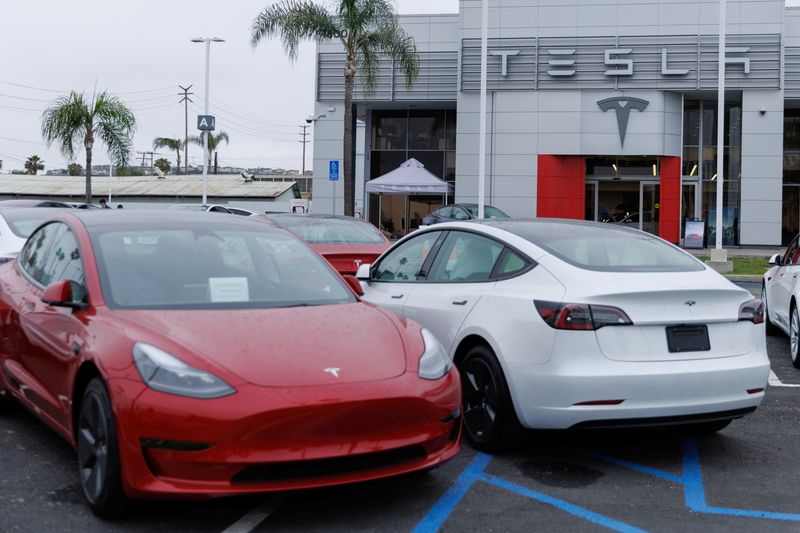By Hyunjoo Jin and David Shepardson
SAN FRANCISCO/WASHINGTON (Reuters) -Tesla Inc's rapid adjustment of its battery supply chain means all of its Model 3 vehicles qualify for federal U.S. credits that, along with other tax breaks, could lower its price to less than a Toyota Camry.
The Biden administration on Tuesday confirmed that all Tesla (NASDAQ:TSLA) Model 3 vehicles now qualify for $7,500 electric vehicle consumer tax credits after two of the three versions were eligible for half the credits.
New battery rules went into effect in April that lowered the credit of the Model 3 Standard Range Rear Wheel Drive and Long Range All-Wheel Drive to $3,750. Tesla last week on its website said that all versions of the Model 3 again qualify for the full credit. The government confirmed the change on its fueleconomy.gov website.
A Model 3 starts at $40,240 and the price may fall to $25,240 when the $7,500 federal tax credit and another $7,500 from the California tax rebate kick in, depending on income and other requirements. Toyota's Camry is listed at $26,320 and higher.
The subsidy change, along with aggressive discounts, should help Tesla prop up sales of its mainstay Model 3, whose demand has been weighed down by a major revamp this year, economic uncertainty and increasing competition.
SUPPLY CHAIN TWEAKS
Analysts said Tesla may have tweaked its battery supply chain to meet both battery mineral and battery component requirements for federal subsidy.
Tesla may have dropped CATL in favor of Panasonic (OTC:PCRFY) or LG Energy Solution for U.S.-made Model 3 Rear Wheel Drive, the cheapest version, Benchmark Mineral Intelligence (BMI) analyst Caspar Rawles said.
The subsidy value would far outpace the saving of using cheaper iron-based cells used by CATL, he said.
"It is highly likely it is Panasonic but there may be some concerns around cell availability if they need to supply enough for all U.S. Model 3s," he said.
Tesla used CATL's LFP battery cells for its Model 3 Rear Wheel Drive and nickel-based cells from LG Energy Solution for its Model 3 Long Range, analysts said.
When asked about Tesla and whether there had been a change in its supply arrangements to North America, CATL said, "The strategic partnership between the company and customers has not changed and will continue to deepen and improve."
Panasonic Holdings on Tuesday said it plans to expand production of electric vehicle batteries at a Nevada factory jointly operated with Tesla by 10% within three years.

The Japanese supplier in May said it had pushed back the timetable for the rollout of the 4680 batteries it is producing for Tesla and indicated that its existing 2170 battery cell would meet immediate demand needs.
Tesla has also started delivering China-made Model 3s and Model Ys to Canada, freeing up some capacity for U.S.-made models.